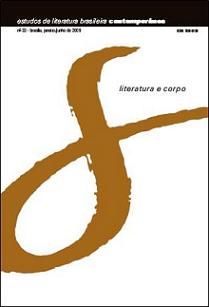O paraíso é bem bacana:
a última “teogonia à s avessas” de André Sant’Anna
Abstract
O mundo vazio de deuses de André Sant’Anna, no seu último enredo sobre um atentado terrorista, é constituído como encenação da mesma violência à linguagem. A tresloucada e caudalosa história de Mané, talvez o personagem mais derrotado da literatura brasileira, certamente pode ser interpretada a partir da noção de literatura menor, concebida por Deleuze e Guattari para considerar, segundo a experiência de Kafka, "o nômade e o imigrado e o cigano de sua própria língua". A pobreza, a banalidade e o caráter chulo do estilo, somados à platitude intelectual dos personagens, configuram uma enunciação coletiva e genérica, um jargão iletrado ou semiletrado, do qual nem o narrador escapa. A abjeção social da cidade pequena e sem perspectivas e da vulgaridade das paixões plana desterritorializada em todos os espaços e caracteriza todos os comportamentos.
Downloads
References
AZEVEDO, Luciene. “O paraíso é bem bacana”. Estudos de Literatura Brasileira Contemporânea, no 28. Brasília, jan.-jul. 2006, pp.171-5.
BENJAMIN, Walter. A origem do drama barroco alemão. Trad. de Sérgio Paulo Rouanet. São Paulo: Brasiliense, 1984.
DELEUZE, Gilles e GUATTARI, Félix. Kafka: por uma literatura menor. Trad. de Júlio Castañon Guimarães. Rio de Janeiro: Imago, 1977.
FONSECA, Rubem. “Intestino grosso”, em _______. Feliz Ano Novo. Rio de Janeiro: Artenova, 1975.
HERKENHOFF, Paulo. “A vista abaixo da linha do equador”, em KAZ, Leonel e LODDI, Nigge (orgs.). Vik. Rio de Janeiro/São Paulo: Aprazível Edições e Arte/MAM/MASP, 2009, pp. 137-42.
MOI, Tori (Edited by). The Kristeva Reader. New York: Columbia University Press, 1986.
PAULA, José Agrippino de. Pan América epopéia. Rio de Janeiro: Tridente, 1967.
SANT'ANNA, André. O paraíso é bem bacana. São Paulo: Companhia das Letras, 2006.
_______. Sexo. Rio de Janeiro: Sette Letras, 1999.
_______. Amor e outras histórias. Lisboa: Cotovia, 2001.
SLOTERDIJK, Peter. Critique of cynical reason. Transl. by Michael Eldred. Minneapolis: University of Minnesota Press, 1997.
SONTAG, Susan. A vontade radical. Trad. de João Roberto Martins Filho. São Paulo: Companhia das Letras, 1987.
Downloads
Published
How to Cite
Issue
Section
License
Authors who publish in this journal agree to the following terms:
a) The authors maintain the copyright and grant the journal the right of first publication, the work being simultaneously licensed under the Creative Commons Attribution License-Non Commercial 4.0 which allows the sharing of the work with acknowledgment of the authorship of the work and publication this journal.
b) Authors are authorized to enter into additional contracts separately, for non-exclusive distribution of the version of the work published in this journal (eg publish in institutional repository or as a book chapter), with authorship recognition and publication in this journal.
c) Authors are allowed and encouraged to publish and distribute their work online (eg in institutional repositories or on their personal page) after the editorial process, as this can generate productive changes, as well as increase the impact and citation of published work (See The Effect of Free Access).
d) The authors of the approved works authorize the magazine to, after publication, transfer its content for reproduction in content crawlers, virtual libraries and the like.
e) The authors assume that the texts submitted to the publication are of their original creation, being fully responsible for their content in the event of possible opposition by third parties.


